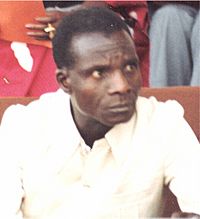Seyni Kountché facts for kids
Quick facts for kids
General
Seyni Kountché
|
|
|---|---|

Kountché in 1983
|
|
| 2nd President of Niger | |
| Supreme Military Council | |
| In office 17 April 1974 – 10 November 1987 |
|
| Prime Minister | Mamane Oumarou |
| Preceded by | Hamani Diori |
| Succeeded by | Ali Saibou |
| Personal details | |
| Born | 1 July 1931 Fandou, Niger, French West Africa |
| Died | 10 November 1987 (aged 56) Paris, France |
| Nationality | Nigerien |
| Political party | Military |
| Spouse | Mintou Kountché |
| Military service | |
| Allegiance | |
| Branch/service | |
| Years of service | 1949–1961 (France) 1961–1987 (Niger) |
| Rank | Sergeant (France) Major General (Niger) |
Seyni Kountché was a military officer from Niger. He was born on July 1, 1931, and passed away on November 10, 1987. In 1974, he led a military takeover, called a coup d'état. This action removed Niger's first president, Hamani Diori, from power. Kountché then became the head of state for Niger. He ruled the country from April 17, 1974, until he died in 1987. Niger's national stadium, Stade Général Seyni Kountché, is named after him.
Contents
Seyni Kountché's Military Career
Seyni Kountché was born in 1931 in Damana Fandou, a town in Niger. His family belonged to the Djerma aristocracy. They were descendants of the Djermakoy Tondikandie.
Kountché started his military journey in 1949. He joined the French colonial army. In 1957, he was promoted to the rank of sergeant. Niger became an independent country on August 3, 1960. One year later, Kountché joined the Niger Army.
From 1965 to 1966, he studied at an officer's training school in Paris. Soon after, he became the deputy chief of staff for the armed forces. In 1973, he was promoted to chief of staff of the armed forces.
Niger's Challenges in 1974
During this time, Niger faced many difficulties. The country had recently become independent. Politically, Niger was a one-party state, meaning only one political party was allowed. President Hamani Diori led this government.
People who opposed the government were not allowed to speak freely. A severe drought hit Niger from 1968 to 1974. This led to serious food shortages. People became very unhappy with the government.
Niger's economy was also weak. Even though the country had large amounts of uranium, it struggled. There were rumors that some government officials were taking food aid for themselves. This caused widespread public anger.
The 1974 Coup d'état
On April 15, 1974, Seyni Kountché led a military coup. This action ended President Diori's rule. Kountché quickly took several important steps. He stopped the country's Constitution and closed the National Assembly. He also banned all political parties. Many political prisoners were released.
On April 17, 1974, a group called the Supreme Military Council (CMS) was formed. Kountché became its president. The CMS said its main goals were to share food aid fairly. They also wanted to bring back honesty to public life. A new group, the National Council for Development (CND), took the place of the National Assembly. Even though political parties were banned, opposition leaders who had left Niger during Diori's rule were allowed to come back.
Military Rule in Niger
The military government focused on fixing the economy. Niger kept good relations with France. It also started new connections with Arab countries. Inside Niger, the country became more stable. However, there were disagreements within the CMS. Attempts to remove Kountché from power were stopped in 1975 and again in 1976.
Moving Towards Civilian Government
In 1981, Kountché started to include more civilians in the CMS. By 1982, plans began for a new form of government based on a constitution. A civilian prime minister, Mamane Oumarou, was chosen on January 24, 1983.
In January 1984, Kountché created a group to write a special document. This document was called a 'national charter'. It was approved by the people in a national vote. The charter set up new advisory groups at national and local levels. These groups were not elected.
Economic Challenges and Tensions
Niger's economy faced difficulties during this time. A new drought happened in 1984 and 1985. Also, the border with Nigeria was closed from 1984 to 1986. This made Niger rely more on money from other countries. Relations with the United States became very important. The U.S. was Niger's main source of food aid.
There was also new tension between Niger and Libya. Libya accused Niger of mistreating the Tuareg population. The Tuareg are light-skinned, nomadic people. In May 1985, after a conflict near the border, all Tuaregs who were not Nigerien citizens were asked to leave the country.
Seyni Kountché's Death
Kountché's health began to get worse in late 1986. It continued to decline throughout 1987. He passed away in a Paris hospital on November 10, 1987. He died from a brain tumor. Ali Saïbou took over after him. On November 14, 1987, Saïbou was named president of the Supreme Military Council (CMS).
See also
 In Spanish: Seyni Kountché para niños
In Spanish: Seyni Kountché para niños

